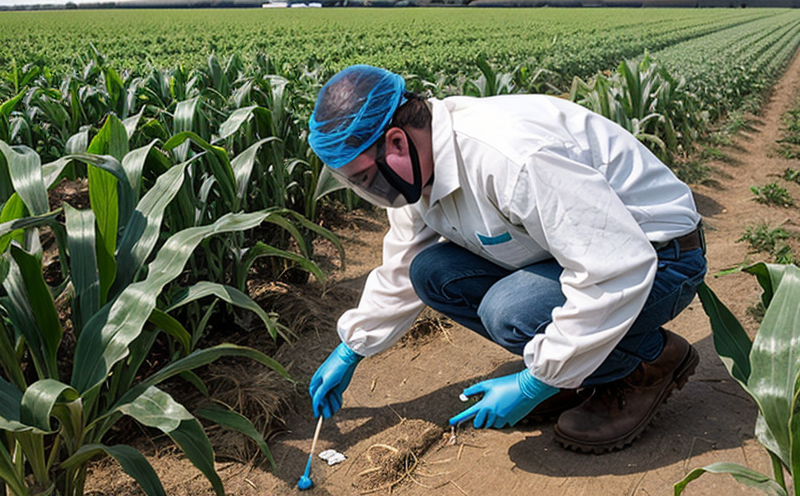Deltamethrin Residue Testing in Crops
Testing for pesticide residues, especially those of Deltamethrin, is critical to ensure compliance with international standards and regulations. Deltamethrin is a synthetic pyrethroid insecticide widely used in agriculture to control pests such as aphids, mites, and thrips. It is important to monitor its presence in crops to prevent potential health risks and environmental impacts.
The primary concern for quality managers and compliance officers is ensuring that the levels of Deltamethrin do not exceed acceptable limits set by regulatory bodies like the FAO and EUROPEAN COMMISSION. The European Union has specific tolerances for Deltamethrin residues, which are outlined in EU Regulation (EC) No 396/2005. Monitoring these residues helps to protect consumer health and the environment.
The testing process involves several key steps. Initially, crops must be properly sampled following standard procedures. The samples are then prepared for analysis using techniques such as extraction and clean-up methods that ensure accurate quantification of Deltamethrin residues. Chromatographic techniques like Liquid Chromatography-Mass Spectrometry (LC-MS/MS) are commonly used due to their high sensitivity and selectivity.
The process also includes method validation, which ensures the reliability and accuracy of the test results. Validation parameters include linearity, precision, accuracy, limit of detection, and limit of quantification. These tests must comply with international standards such as ISO, ASTM, and EN Standards. Proper validation ensures that the test results are reliable and can be trusted by all stakeholders.
Once validated, the samples undergo analysis using advanced analytical instruments. The data is then processed and reported according to the specifications of the client or regulatory body. The report typically includes detailed information about the sample tested, the method used, the results obtained, and any compliance status with applicable regulations.
Industry Applications
Deltamethrin residue testing in crops is essential across various industries, including agriculture, food processing, and environmental monitoring. Here are some of the key applications:
- Agricultural Compliance: Ensuring that crops do not exceed allowed limits for Deltamethrin residues to comply with international standards.
- Food Safety: Protecting consumers from potential health risks by ensuring safe levels of pesticides in food products.
- R&D: Supporting research and development efforts to optimize pest control strategies without compromising crop quality or safety.
| Application | Description |
|---|---|
| Agricultural Compliance | Testing for Deltamethrin levels in crops to ensure compliance with EU Regulation (EC) No 396/2005. |
| Food Safety | Maintaining the safety of food products by ensuring that Deltamethrin residues are within acceptable limits. |
| R&D | Supporting research into more effective pest control methods without harmful effects on crops or the environment. |
Eurolab Advantages
At Eurolab, we offer comprehensive and accurate Deltamethrin residue testing services tailored to meet the needs of various clients. Our advantages include:
- Accurate Testing: Utilizing advanced analytical techniques such as LC-MS/MS for precise quantification.
- Comprehensive Validation: Ensuring that all tests are validated according to international standards.
- Expertise: Our team of experienced scientists and technicians provide reliable results.
- Regulatory Compliance: Ensuring that all test results comply with applicable regulations and guidelines.
We pride ourselves on delivering high-quality, accurate, and timely services to our clients. Whether you are a quality manager or an R&D engineer, Eurolab can provide the support you need for your Deltamethrin residue testing requirements.
Use Cases and Application Examples
Deltamethrin residue testing is crucial in several scenarios. For instance:
- Post-Harvest Testing: Ensuring that crops are safe for consumption after harvesting, especially when Deltamethrin has been used as a pesticide.
- R&D Projects: Investigating the effects of Deltamethrin on crop health and yield without exceeding permissible residue levels.
- Compliance Audits: Providing evidence for regulatory compliance during inspections or audits.
In each case, accurate testing is paramount to ensure that crops meet safety standards. Our laboratory uses state-of-the-art equipment and follows strict protocols to provide reliable test results.





